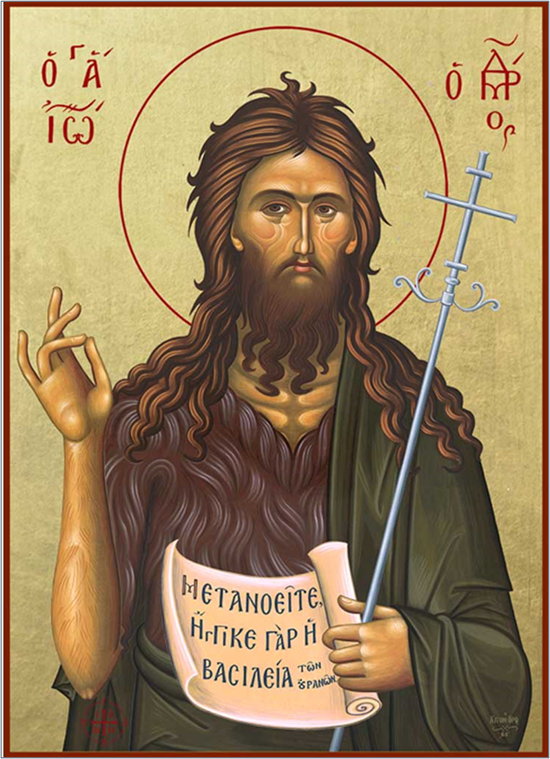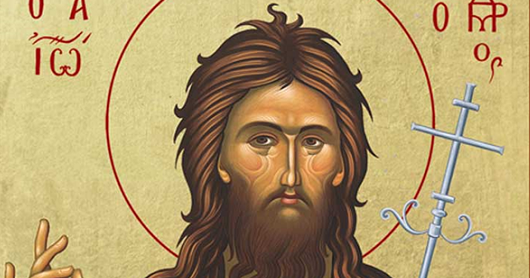Who Is the Messiah?
Second Sunday of Advent Scripture Readings

Why John the Baptist? What does this character add to the story of the coming of the Messiah that the evangelists should make such a big deal out of him? There are at least two reasons why we find John taking a central role in the gospels.
The first reason is historical. The people of Israel at that time were anxiously awaiting the coming of the Messiah—an anointed king like David—who would rescue Israel from its enemies and restore it to greatness. “Awaiting” may be too weak a word to describe the popular sentiment at that time. They were chomping at the bit in anticipation. As each charismatic personality took the stage, the populous would flock to them in fervent hope that this one would be the one. Again and again, their expectations were disappointed. If nothing else, John was certainly one of those charismatic personalities.
Far from being the political leader the people were looking for, John’s presence and message were unique. He was an ascetic, dressing crudely and eating the simplest of desert fare, rather than appearing as a showy, rabble-rousing insurrectionist. His basic message was a simple one: repent. Adopt a spirit of metanoia. Change your mind and heart and from your worldly ways turn back to Yahweh, the God of Israel. His message stood in sharp contrast to the religious leaders of the day who taught orthodoxy. They directed their message to the religiously observant and demanded perfection. In that way, they were preaching to the choir. That wasn’t John’s approach.
John’s outreach was to those whom the religious leaders of the day had written off: soldiers, tax collectors, the fallen-away, and those who, in the eyes of the Law of Moses, were ritually impure. His message of metanoia to them was actually a message of hope. In effect, “You, too, are children of Israel, worthy of a relationship with our God. All you need to restore your relationship with God is to change your mind.” Unlike the charismatic leaders who came before him, he offered a simple sign of that change of heart: baptism. And, unlike the other ascetics of his time like those in the community at Qumran, his baptism was a singular event that signaled a permanent commitment, once and for all.
Because of the way John presented himself and his message, it was clear to all that his mission was identical to that of the prophets of old. For this reason, he had an immense and loyal following. If only for that, the gospels couldn’t ignore him. Even many of Jesus’s disciples had been disciples of John. Although we have no evidence that John ever claimed to be the Messiah, large segments of the population both before and after his arrest and execution believed wholeheartedly that John was the one. Even after Jesus’s resurrection, the early Church found in John’s disciples not only rivals but opponents. It was critical that the gospels put the role of John in stark contrast to that of Jesus.
The second reason why John the Baptist appears in the gospels is a spiritual one. The evangelists all stress that John and his message were, in fact, solidly in the line of the prophets of old, even to the fact that, like so many prophets before him, John was killed by the political authorities to silence his public criticism of their morals. Even Jesus made that accusation when he said, “Jerusalem, Jerusalem! You kill the prophets and stone to death those who are sent to you.” [Luke 13:34] The message of John the Baptist was in harmony with the warnings of Jeremiah, and his personality was the embodiment of the one spoken of by Isaiah as we heard in today’s readings, “a voice of one crying out in the desert.”
We assign to John the Baptist the role of herald of the coming of the Messiah. That’s why the Church highlights his life and message now, during the season of Advent. Even so, John’s role as precursor wasn’t perfectly clear, even to him. Remember that, from prison, he sent his disciples to Jesus to ask, “Are you the one who is to come, or are we to look for another?” [Matthew 11:3] Still, his witness paved the way for Jesus’s mission and his redemptive work. John was, indeed, the last of the prophets of old.
When we consider the coming of the Messiah that John heralded, that “coming” is itself a prophetic event. That means that the event is not temporally bound. It may exist in an historical context, but it transcends it. Like God himself, prophetic sayings and actions are trans-historical. They’re in an historical context, but not of it. Their meaning continues to unfold, deepen, and broaden with time. The coming of the Messiah itself is that kind of reality. It was foreseen and pointed out by the prophets and John the Baptist, it took flesh at the Nativity of Jesus and manifested itself in his life, death, and resurrection, but its effects are present in our lives as members of Christ’s Body, the Church, and especially in this liturgy. Yet, it is not complete. We look for its fulfillment at the end of the ages, it remains to be seen whether that be the end of time or the end of our time.
The coming of the Messiah as preached by John the Baptist and the prophets of old is timeless. It revealed itself in the past, it’s happening now in the present, and it will continue to reveal itself in the future. The Advent of our God was in the beginning, is now, and ever shall be. As we proclaim at our Easter Vigil, “Christ yesterday and today, the beginning and the end, the alpha and the omega. All time belongs to him and all the ages. To him be glory and power through every age and for ever. Amen.
Get articles from H. Les Brown delivered to your email inbox.
